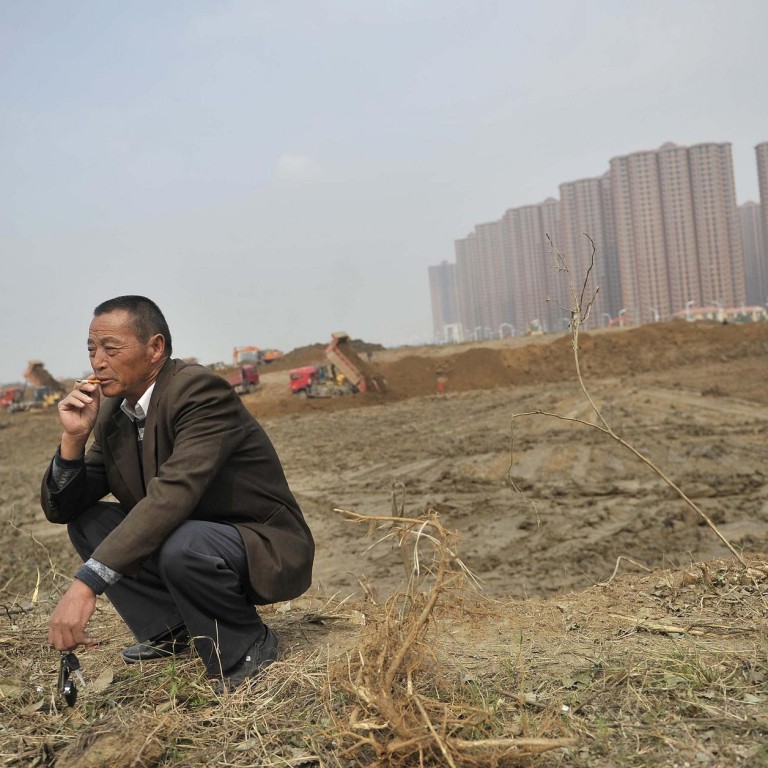
Rural land restrictions in China hurt efforts to raise farmers' incomes
The rules, experts say, have hobbled efforts to raise incomes of farmers and develop the Chinese countryside over the last decade
Five years ago, Tao Zhengrong began renting seven hectares of fields from villagers near his home 50 kilometres west of central Shanghai in hopes of starting a farming project.
Ideally, to raise money for the endeavour, he said, he would have been able to take out a mortgage on his house and land.
His plight was common to that of many Chinese rural dwellers. They own their homes but only have usage rights to their land, which is collectively owned by the village; the law forbids the mortgaging of rural plots, and trading of farmers' property is allowed only within the village itself. There are exceptions, but only for designated pilot projects.
Urban land, labelled as state-owned, is free to be traded.
The rural restrictions, experts say, have hobbled efforts to raise the incomes of farmers and develop the Chinese countryside over the last decade as millions left for cities in search of better lives.
But hopes are high among some land experts that the Communist Party's Central Committee will use its third plenary session to examine how the rural land system can be changed to benefit property owners and farmers.
Zheng Fengtian, a professor of agricultural economics and rural sociology at Renmin University of China in Beijing, says allowing the mortgaging of farmland and the trading of non-farmland in rural areas were major reforms needed.

Mortgages on rural land would be a goldmine for farmers, Zheng says. They would allow housing development, adding great value to farmers' properties and fields, he says.
Under the current system, a real estate developer who wants to build on a rural parcel of land must buy it from a county government, which first buys it from the village.
Buying rural land at low prices and selling it for a big mark-up has become an important tactic of local governments to raise money in the past few decades as property development has taken off. Village officials have tangled with local governments over what they see as profit-making at the villages' expense.
A recently unveiled paper from a top government think tank says rural land reform was one of the areas that the central government views as key to advancing economic reforms.
The State Council's Development Research Centre has proposed granting farmers the right to trade their collectively owned land under a unified open market in which urban and rural lands would be valued equally.
The research centre also suggested raising compensation for farmers when their land is claimed by local governments for development projects. Other suggestions include imposing a tax on land ownership instead of on land transactions and establishing a state-owned company to manage state-owned land instead of the government.
Song Hongyuan, director of the Ministry of Agriculture's Research Centre for Rural Economy, says some key points suggested by the research centre were mentioned as early as at the party's previous third plenum five years ago. At that meeting, the party's then leaders proposed that rural and urban land be equally valued, building an open market for them and changing the way land is requisitioned.
"So what has been talked about is nothing new. The point is to take action, to experiment," he says.
He says he expects more pilot programmes to start after the current leaders' meeting, but he doesn't anticipate sweeping change for the entire country.
Zheng says progress has been slow mainly because local governments are reluctant to let go of a system that lets them buy up rural land cheaply and sell it to developers for a large profit. "It's not easy to take away the local governments' cheese," he says.
Dang Guoying, a researcher with the Rural Development Institute at the Chinese Academy of Social Sciences, expects that the third plenum will repeat ideas for land reform mentioned five years ago.
"There will be no breakthrough in terms of ideas,'' he says. "What counts is whether real action will be taken."
Party leaders must provide specific changes, Dang says, such as how best to prevent the reduction of arable land, as well as reforming taxation.
Farmer Zhu Jianhua, from Jianli county in Hubei province, says the government has to think broadly about improving the lot of rural dwellers. He owns a vegetable farm, but no bank would allow him to get a mortgage for his house and land.
As more rural residents lease out their land after finding jobs in cities, Zhu says another issue of concern involves taking care of the elderly left behind.
The government should provide much better social security, he argues.
It all goes back to treating land everywhere the same, Zhu says.
"Whether in the countryside or in the city, the land is all part of this country," he says, asking: "Why should some [of it] be treated differently?"

